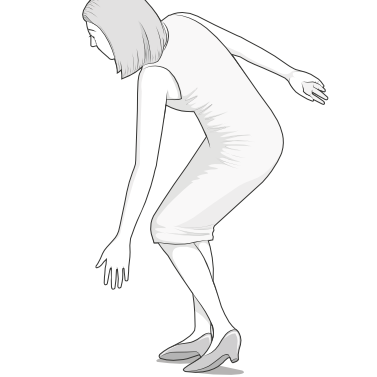Cruciate instability is a feeling of abnormal movement in the knee joint consequent on damage to one or both cruciate ligaments.
 Page updated June 2024 by Dr Sheila Strover (Clinical Editor)
Page updated June 2024 by Dr Sheila Strover (Clinical Editor)

Is cruciate instability often associated with meniscus tears?
There is a strong association between cruciate ligament tears and meniscal tears, but it is not always easy to know if they occurred in the same injury or whether instability of the one led to damage of the other.
It is a challenge for the surgeon to decide on surgery for the cruciate problem, as a delay may lead to the meniscus damage.
-
Quote from peer-reviewed paper:
"....Information regarding the number of instability episodes should be obtained early in the history of patients with ACL injury, as this may influence the likelihood of having medial meniscal damage...."
"....lateral meniscal damage...(is) more common in an acute ACL injury and medial meniscal damage...(is) more common in a chronic ACL injury...."Citation: Sommerfeldt M, Raheem A, Whittaker J, Hui C, Otto D. Recurrent Instability Episodes and Meniscal or Cartilage Damage After Anterior Cruciate Ligament Injury: A Systematic Review. Orthop J Sports Med. 2018 Jul 24;6(7):2325967118786507. doi: 10.1177/2325967118786507. PMID: 30057927; PMCID: PMC6058426.
Is the timing of cruciate reconstruction important?
The timing between cruciate injury and cruciate ligament reconstruction is still a hot topic.
In the 1980's it was common to do an early reconstruction, but it was found that unsettled inflammation in the knee frequently led to stiffness from arthrofibrosis.
Practice, therefore, changed to allow a period of rehabilitation before any reconstructive surgery, and this also allowed an assessment of the degree of stability the patient had despite the cruciate injury.
Does chronic cruciate instability always lead to osteoarthritis?
There is a relationship between the frequency of instability episodes and the development of eventual osteoarthritis in the knee, but the statistical correlation is not a straight line.
So not everyone who has frequent instability episodes will end up with arthritis, but it is certainly more likely.
-
Quote from peer-reviewed paper:
"....The long-term risk of osteoarthritis in ACL-deficient knees is high. It remains unclear whether reconstruction of the ACL significantly reduces this risk. The status of the meniscus at the time of ACL reconstruction is a strong predictor of the risk of osteoarthritis."
Citation: Magnussen RA, Duthon V, Servien E, Neyret P. Anterior Cruciate Ligament Reconstruction and Osteoarthritis: Evidence from Long-Term Follow-Up and Potential Solutions. Cartilage. 2013 Jul;4(3 Suppl):22S-6S. doi: 10.1177/1947603513486559. PMID: 26069662; PMCID: PMC4297065.
Forum discussions
- Recent Injury - Help me - I need some peace of mind
A patient's knee feels unstable after an injury.
- Meniscal tear and a weak/deficient ACL.
A patient explains how instability of the meniscus and ACL can be related, and the difficulties of deciding on reconstructive surgery.
More cruciate info -
Primer -
- Primer - 2019 - Cruciate Ligaments - by Dr Sheila Strover (Clinical Editor)
 2017 -
2017 -  2017 -
2017 -  2008 -
2008 -